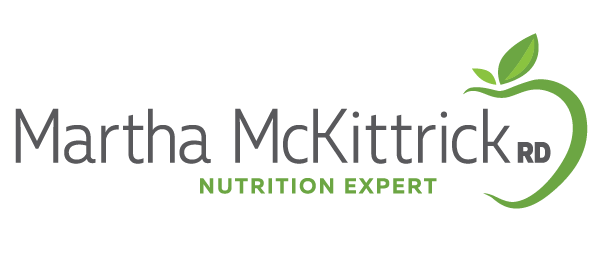Nutrition and Lifestyle Tips for Fertility in PCOS

Eating a healthy diet is one of the most important steps you can do to take control of your PCOS. And it becomes even more important when you are trying to conceive. It’s estimated that 40% of women with PCOS will experience difficulties with fertility. PCOS is believed to be responsible for as much as 70% of infertility issues in women! In addition, insulin resistant women with PCOS have higher rates of miscarriage and increased risk of gestational diabetes. The good news is that there are many things you can do from a nutrition / lifestyle standpoint that can greatly increase your chances of getting pregnant and having a healthy baby. Nutrition and lifestyle play a major role in fertility in PCOS.
While we do know that losing weight if overweight can improve fertility, keep in mind that no research proves that a certain diet increases or decreases fertility. But studies have shown that certain dietary or lifestyle habits are associated with improved or decreased fertility. There are some studies done specifically on PCOS and fertility – but this is an area where more research is needed!
Many of my recommendations are based on the results from the Nurses’ Health Study. It’s one of the largest and longest-running investigations into women’s health in the U.S. The study led by researchers at Harvard University used data from more than 18,000 women. Those findings were detailed in “The Fertility Diet,” book which offered dietary guidelines for preventing and reversing ovulatory infertility.
These recommendations will look familiar to you, as they are the same general recommendations that most health experts recommend for PCOS. But this is time to pay even more attention to them! Ideally start diet for 3-6 mo prior to TTC.
Warning …. this is a long post!
15 nutrition and lifestyle tips for fertility in PCOS
- Lose weight if overweight.
One of the most important factors affecting fertility is body weight. This is very important for women with PCOS as up to 80% are overweight or obese. I know many of you are thinking “easier said than done”! But the good news is that even losing 5-10% of your body weight improves the body’s sensitivity to insulin, lowers levels of androgens, and improves menstrual regularity and ovulation. So for a woman who weighs 175 pounds, this could be as little as 8 pounds! Weight loss also reduces blood sugar and inflammation - Eat foods with low GI

I’m sure you’ve heard this one before! We know that more rapidly digesting carbs will have a greater impact on insulin levels. But the impact on fertility is a bit surprising. The Nurses Health Study showed that women who consumed the carbs with the highest glycemic load were 92% more likely to have fertility problems compared to women who consumed the lowest glycemic load carbs. Consuming high glycemic index/load carbs increase insulin levels which will decrease SHBG. Since SHBG binds testosterone, less SHGB means more free testosterone. Low glycemic load carbs include whole grains, beans, vegetables and fruit. Adding fats (preferably healthy fats such as olive oil, avocado, nuts, nut butters) to these carbs can slow the rise of blood sugar even more. (Pic credit)
- Avoid trans fats.
Trans fats are associated with increased risk of infertility due to inceased inflammation, which interferes with ovulation, conception, and early embryonic development. It also stops PPAR-gamma activation resulting in higher circulating insulin. Partially hydrogenated oils contain trans fats and are found in margarine, shortening, some coffee creamers, cookies, crackers contain trans fats. It’s been shown that for each 2% increase in calories from trans fats, a 73% greater risk of ovulatory infertility occurs. (Pic credit) - Include healthy fats at meals and snacks.
Healthy fats found in unsaturated fats (monounsaturated and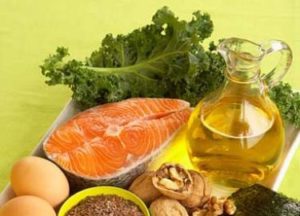 polyunsaturated fats) have been shown to increase fertility. They decrease inflammation and increase insulin sensitivity. Healthy fats include nuts and nut butters, avocado, olives, seeds including flaxseeds, chia seeds and hemp seeds and vegetable oils (unrefined like extra virgin olive oil). You also get healthy fats from fatty fish like salmon, sardines, and herring
polyunsaturated fats) have been shown to increase fertility. They decrease inflammation and increase insulin sensitivity. Healthy fats include nuts and nut butters, avocado, olives, seeds including flaxseeds, chia seeds and hemp seeds and vegetable oils (unrefined like extra virgin olive oil). You also get healthy fats from fatty fish like salmon, sardines, and herring - If you consume dairy, make it full fat or at least 2% and avoid fat free. I know the topic of dairy is controversial! However, if you choose to consume it, go for full fat! Studies have shown that those who consume full fat dairy have greater
 pregnancy rates than those consume fat free or skim. Here’s why – in addition to water, fat, protein, and carbohydrates (mainly lactose), milk contains numerous other substances including both female and male sex hormones. Sex hormones like estrogen, progesterone and some androgens are attached to the fat globules in full fat milk. So when milk is skimmed to create fat free milk, many of these hormones are removed. Left behind are some androgens, IGF-1 and prolactin. This does not bode well for ovulation! Extra IGF-1 can depress the body’s production of sex hormone binding globulin (SHBG) which can ultimately increase the ratio of free testosterone to estrogen in the blood. Too much prolactin can suppress ovulation. High fat dairy has higher levels of estrogen which resulted in decreased levels of IGF-1. IGF-1 has been associated with infertility and decreased ovarian function as seen in cases of PCOS. So removing the fat from milk radically changes its balance of sex hormones in a way that could tip the scales again ovulation and conceptions.With regards to PCOS and infertility, studies showed an inverse relationship between full fat dairy and infertility. So ladies, if you choose to consume dairy, pass by the fat free and go for the full fat (or at least 2%)! But if you trying to watch your weight, you’ll need to cut back on calories some place else to account for the extra calories
pregnancy rates than those consume fat free or skim. Here’s why – in addition to water, fat, protein, and carbohydrates (mainly lactose), milk contains numerous other substances including both female and male sex hormones. Sex hormones like estrogen, progesterone and some androgens are attached to the fat globules in full fat milk. So when milk is skimmed to create fat free milk, many of these hormones are removed. Left behind are some androgens, IGF-1 and prolactin. This does not bode well for ovulation! Extra IGF-1 can depress the body’s production of sex hormone binding globulin (SHBG) which can ultimately increase the ratio of free testosterone to estrogen in the blood. Too much prolactin can suppress ovulation. High fat dairy has higher levels of estrogen which resulted in decreased levels of IGF-1. IGF-1 has been associated with infertility and decreased ovarian function as seen in cases of PCOS. So removing the fat from milk radically changes its balance of sex hormones in a way that could tip the scales again ovulation and conceptions.With regards to PCOS and infertility, studies showed an inverse relationship between full fat dairy and infertility. So ladies, if you choose to consume dairy, pass by the fat free and go for the full fat (or at least 2%)! But if you trying to watch your weight, you’ll need to cut back on calories some place else to account for the extra calories - Make some of your protein vegetarian

In the Nurses Study, consumption of vegetable protein instead of carbohydrates or animal protein from chicken or red meat was associated with a substantially lower risk of ovulatory infertility. Infertility was 39% more likely in women with the highest intake of animal protein than with the lowest. The exact cause for this is not known, however it’s suggested that the insulin response to vegetable protein and egg protein is lower than that to red meat and turkey protein. Another possible mechanism underlying the observed associations could be a differential effect of animal and vegetable protein on circulating insulin-like growth factor (IGF)-I levels. Elevated levels of free IGF-I may be involved in the development of PCOS. Holmes et al found that, in women, animal protein intake was positively associated with IGF-I levels, whereas vegetable protein intake was not related to this hormone. Adding a serving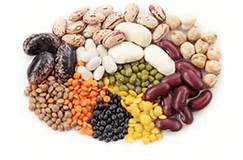 of fish or eggs didn’t influence ovulatory infertility.Here’s the dilemma – I find that most of my patients with PCOS feel better, have fewer cravings and find it easier (well not actually “easy”!) to lose weight on a higher protein diet. Many studies have found that higher protein diets aide in greater weight loss, which in turn will decrease insulin levels – which will improve fertility. Yet too much animal protein decreases fertility. But the main point here is to get some of your protein from vegetable sources (nuts and nut butters, seeds, beans and peas. Even vegetables and whole grains contain some protein). While some women with PCOS choose to avoid soy, non-GMO soy in moderation is another vegetable source of protein. Eggs and fish did not negatively influence fertility and are a great source of protein. Just avoid fish high in mercury.
of fish or eggs didn’t influence ovulatory infertility.Here’s the dilemma – I find that most of my patients with PCOS feel better, have fewer cravings and find it easier (well not actually “easy”!) to lose weight on a higher protein diet. Many studies have found that higher protein diets aide in greater weight loss, which in turn will decrease insulin levels – which will improve fertility. Yet too much animal protein decreases fertility. But the main point here is to get some of your protein from vegetable sources (nuts and nut butters, seeds, beans and peas. Even vegetables and whole grains contain some protein). While some women with PCOS choose to avoid soy, non-GMO soy in moderation is another vegetable source of protein. Eggs and fish did not negatively influence fertility and are a great source of protein. Just avoid fish high in mercury. - Eat a diet rich in antioxidants
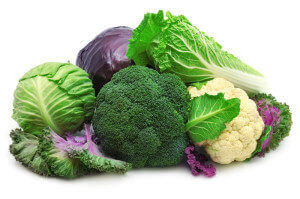
We’ve all heard about the health benefits of antioxidants. But what most people don’t know, it that they can play an important role in fertility. They help to neutralize the harmful effects of free radicals in our bodies. Free radicals are highly reactive chemicals that may be formed through natural human physiological processes as well as from diet, stress, smoking, alcohol, exercise, inflammation, drugs or exposure to sunlight and air pollutants. They can damage cell membranes, accelerate the aging process, increase risk of diseases including cancer … and have a negative effect on fertility. Free radicals can affect virtually every step in the reproductive process, from egg maturation to pregnancy.Examples of antioxidants include vitamins C and E and folate plus carotenoids such as beta-carotene and lutein as well as minerals such as selenium, zinc, and copper.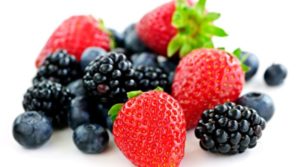 The following foods are rich in antioxidant capacity. Try to include as many as you can in your fertility diet … as well as an overall healthy diet for PCOS.
The following foods are rich in antioxidant capacity. Try to include as many as you can in your fertility diet … as well as an overall healthy diet for PCOS.
– Fruits: blackberries, red currants, raspberries, strawberries, blueberries, oranges, pineapple, plums, and pomegranates
– Vegetables: spinach, chile peppers, black and green olives, mushrooms, asparagus, arugula, radicchio, beets, broccoli, artichokes, and red peppers
– Spices: clove, allspice, mint, sage, thyme, nutmeg, rosemary, saffron, tarragon, oregano, ginger, cinnamon, natural cocoa
– Beverages: pomegranate, grape, prune, and cranberry juices (Espresso, coffee, and green and black teas also contain antioxidants but should be consumed in moderation.)
– Nuts, seeds, and grains: walnuts, pecans, sunflower seeds, chestnuts, peanuts, pistachios, buckwheat, millet, and barley -
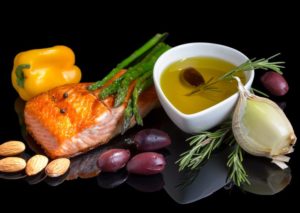
Mediterranean omega-3 diet. Fish steak, olives, nuts and herbs isolated on black background with reflection.
Follow a Mediterranean style diet
We’ve all heard about the health benefits of the Mediterranean diet when it comes to heart health. This diet is characterized by vegetables, vegetable‐based oils (especially olive oil), nuts, legumes, and fish and low intake of high glycemic carbs and processed snacks. It turns out this diet also improves rates of fertility. A Spanish case–control study compared ‘‘Mediterranean-type’’ and ‘‘Western-type’’ dietary patterns. Women following the Mediterranean diet had 44% less difficulty conceiving compared to the women consuming the typical Western diet.The Netherlands prospective cohort study showed following a preconception Mediterranean-type diet was associated with a 40% increased probability of pregnancy among couples undergoing IVF. Women on the Mediterranean diet had higher red blood cell folate, B6, and levels of follicular fluid.
- Exercise … but don’t go overboard
Exercise can help with weight loss, relieving stress, helping with sleep, improving mood, and very importantly – lowering insulin levels. The ideal program exercise program for PCOS would include weight training and cardio. HIIT (high intensity interval training) has also been found to be especially effective for women with PCOS. Weight training is important to increase insulin sensitivity. But don’t let these types of exercise intimidate you. Just get out and move. Find something that you enjoy! It also needs to be convenient.There is some conflicting data when it comes to how much exercise you should be doing to improve fertility. Results from the Nurses’ Health Study shows that exercise, particularly vigorous exercise, improves fertility. In addition, the Harvard researchers recommend getting an hour a day if you are overweight. Keep in mind that this can be broken up into three 20 minute walks. However other studies suggest caution against “over-exercising” when trying to get pregnant. Take home point, try to be active most days of the week for at least 30 minutes, Ideally include some weight training and cardio (which could be a brisk walk). However – if you are trying to get pregnant, this is not the time to train for your first triathlon or sign up for unlimited classes at Barry’s Bootcamp!
and cardio. HIIT (high intensity interval training) has also been found to be especially effective for women with PCOS. Weight training is important to increase insulin sensitivity. But don’t let these types of exercise intimidate you. Just get out and move. Find something that you enjoy! It also needs to be convenient.There is some conflicting data when it comes to how much exercise you should be doing to improve fertility. Results from the Nurses’ Health Study shows that exercise, particularly vigorous exercise, improves fertility. In addition, the Harvard researchers recommend getting an hour a day if you are overweight. Keep in mind that this can be broken up into three 20 minute walks. However other studies suggest caution against “over-exercising” when trying to get pregnant. Take home point, try to be active most days of the week for at least 30 minutes, Ideally include some weight training and cardio (which could be a brisk walk). However – if you are trying to get pregnant, this is not the time to train for your first triathlon or sign up for unlimited classes at Barry’s Bootcamp!  Avoid endocrine disruptors
Avoid endocrine disruptors
This is a newly emerging field of research. Endocrine disruptors (ED) are substances in our environment, food, and consumer products that disrupt the functioning of our highly sensitive hormonal system. They can have deleterious effects on our whole bodies – including our reproductive systems via numerous mechanisms. Current data suggest that environmental levels of EDs may affect the development and functioning of the reproductive system in both sexes, particularly in fetuses, causing developmental and reproductive disorders, including infertility. BPA is a potent endocrine disruptor that that acts like a synthetic estrogen. It’s been linked to a wide variety of health problems, including infertility, breast and reproductive system cancer, obesity, diabetes, early puberty, and possibly PCOS. Women with PCOS have been found to have higher levels of BPA; and increased testosterone in these women is consistent with decreased clearance of BPA. More research needs to be done in the area of PCOS and endocrine disruptors. Pic credit Read this link for a comprehensive overview of endocrine disruptors.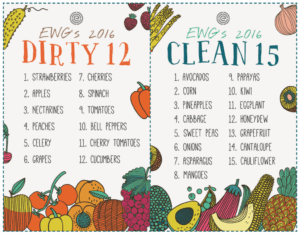 Here are some recommendations to limit EDs
Here are some recommendations to limit EDs
-Use fresh food rather than processed foods
-Reduce use of foods/beverages in cans/plastic containers, including their use for food storage. Even BPA free containers may contain BPS, which also have endocrine-disruptive effects
– Use filtered water and stainless steel water bottles
-Choose organic food meat, pork, poultry
– Remove fatty skin (i.e. on salmon
– Choose organic fruits and vegetables when possible. Read the EWG’s list of Clean 15 and Dirty Dozen for produce
– Make careful fish choice
– Minimize the use of personal care products such as moisturizers, cosmetics, shower gels and fragrance
– Avoid the use of garden/household/pet pesticides or fungicides (such as fly sprays or strips, rose sprays, flea powders) (pic credit)- Consume a multivitamin with adequate folic acid & iron
While I generally recommend trying to get your nutrients from food, it’s not always possible when it comes to some nutrients, including folic acid and iron. Findings from the Nurses’ Health Study indicated that at least 700 micrograms of folic acid are needed to improve ovulation and conception, which is double the recommendation for the average women. For iron, the fertility benefits begin to appear between 40-80 mg a day, 2-4 times higher than the general recommendation. In this study, women who took multivitamins were 40% less likely to encounter ovulatory infertility over an 8 year period than those women who didn’t take them. While the exact mechanism is not known, some studies suggest that there is something in the multivitamin (with folic acid and iron) that enhances ovulation or the survival ability of the embryos. Another reason to consume adequate folic acid is that it helps prevent neural tube defects in the baby.Folic acid is found in dark leafy greens and fortified grains. Iron is found in meat is called “heme iron” and iron found in beans, some fruits and vegetables, grains and supplements is called “non-heme”. Studies have shown that non-heme iron tends to improve fertility more than heme. Since most women with PCOS tend to follow lower carb diets, it’s highly unlikely they will meet their high folic acid and iron needs when trying to conceive. It’s recommended that all women trying to conceive take a prenatal vitamin with at least 400 micrograms of folic acid and 40 mg of iron or more. Check with your doctor for more individualized recommendations.
some nutrients, including folic acid and iron. Findings from the Nurses’ Health Study indicated that at least 700 micrograms of folic acid are needed to improve ovulation and conception, which is double the recommendation for the average women. For iron, the fertility benefits begin to appear between 40-80 mg a day, 2-4 times higher than the general recommendation. In this study, women who took multivitamins were 40% less likely to encounter ovulatory infertility over an 8 year period than those women who didn’t take them. While the exact mechanism is not known, some studies suggest that there is something in the multivitamin (with folic acid and iron) that enhances ovulation or the survival ability of the embryos. Another reason to consume adequate folic acid is that it helps prevent neural tube defects in the baby.Folic acid is found in dark leafy greens and fortified grains. Iron is found in meat is called “heme iron” and iron found in beans, some fruits and vegetables, grains and supplements is called “non-heme”. Studies have shown that non-heme iron tends to improve fertility more than heme. Since most women with PCOS tend to follow lower carb diets, it’s highly unlikely they will meet their high folic acid and iron needs when trying to conceive. It’s recommended that all women trying to conceive take a prenatal vitamin with at least 400 micrograms of folic acid and 40 mg of iron or more. Check with your doctor for more individualized recommendations. - Consume DHA
While this tip doesn’t actually increase fertility, it’s important for the health of your baby. DHA (docosaohexaenic acid) is an omega 3 fatty acid that is important for our overall health, but is crucial for the baby’s brain and retinal development. The recommendation is to consume 12 oz of fatty fish a week. Most women don’t meet this recommendation, especially when trying to conceive due to the concerns of mercury in fish. Therefore it’s recommended that you take a supplement with at least 200 micrograms of DHA. You should also try to consume some fatty fish including salmon (wild if possible), bluefish, mackerel, herring, sardines and lake trout. Avoid eating fish high in mercury – swordfish, shark, king mackerel, orange roughy, marlin, and tilefish. Read this FDA link for the best and worst fish: Eating Fish: What Pregnant Women and Parents Should Know 2017 - Curb your caffeine
 It’s recommended that you keep your intake of caffeine to 200 mg or less a day. Some studies show caffeine increases risk of miscarriage. Severalstudies have shown that caffeine increases the length of time it takes to conceive. One study showed that women who drank more than one cup of coffee a day were half as likely to become pregnant per cycle as compared to women who consumed less. Another study in patients undergoing in vitro fertilization (IVF) demonstrated that women who consumed even modest amounts of caffeine (50 mg) were likely to have decreased live birth rates. While the exact mechanism by which caffeine affects fertility is unknown, the answer may be related to the ability of caffeine to influence the quality of the developing oocyte (egg) Read my previous blog post on caffeine content of foods/beverages
It’s recommended that you keep your intake of caffeine to 200 mg or less a day. Some studies show caffeine increases risk of miscarriage. Severalstudies have shown that caffeine increases the length of time it takes to conceive. One study showed that women who drank more than one cup of coffee a day were half as likely to become pregnant per cycle as compared to women who consumed less. Another study in patients undergoing in vitro fertilization (IVF) demonstrated that women who consumed even modest amounts of caffeine (50 mg) were likely to have decreased live birth rates. While the exact mechanism by which caffeine affects fertility is unknown, the answer may be related to the ability of caffeine to influence the quality of the developing oocyte (egg) Read my previous blog post on caffeine content of foods/beverages - Limit/avoid alcohol
 This one is not just for the ladies! Alcohol intake by men and women during the week of conception is associated with a higher risk of miscarriage. Even small amounts of alcohol increase the formation of free radicals and the amount of antioxidants you need, so if you were a regular drinker before, you may need to boost your antioxidant intake. For the guys: they should be limiting alcohol as well. Alcohol can be found in semen shortly after drinking, thus it can directly interfere with conception and implantation, and it may impact early miscarriage. For all these reasons, when you’re serious about trying to conceive, both men and women should avoid alcohol.
This one is not just for the ladies! Alcohol intake by men and women during the week of conception is associated with a higher risk of miscarriage. Even small amounts of alcohol increase the formation of free radicals and the amount of antioxidants you need, so if you were a regular drinker before, you may need to boost your antioxidant intake. For the guys: they should be limiting alcohol as well. Alcohol can be found in semen shortly after drinking, thus it can directly interfere with conception and implantation, and it may impact early miscarriage. For all these reasons, when you’re serious about trying to conceive, both men and women should avoid alcohol. - Consider supplements: In addition to a prenatal multivitamin with iron, folic acid and DHA, there are a few other supplements I often recommend for women with PCOS including: d-chiro-inositol, NAC, CoQ10 and berberine. Refer to Angela Grassi’s PCOS Nutrition Center for some excellent info in this area!BONUS tip: In another study published early in 2019 and co-authored by Chavarro, a “pro-fertility diet” that included high levels of folic acid, vitamin B12 and vitamin D, as well as dairy, soy and low-pesticide produce, had a more favorable outcome on fertility when followed in conjunction with assisted reproductive technologies, compared with the Mediterranean diet.
Bottom line
Nutrition and lifestyle have been shown to play a critical role in fertility. While you can’t control the fact that you have PCOS, you can control your diet and lifestyle habits. Numerous studies have shown that you can improve your fertility by decreasing high glycemic index/load carbs, consume carbs in moderation, consume adequate protein including vegetable protein and fish, consume a diet rich in plant foods including nuts, seeds, olive oil, beans and fish.
References:
Chavarro J. Willet, W. The Fertiity Diet. New York, NY: McGraw Hill: 2007
Weight loss and hormone balance Bohler, et al. Adipose tissue and reproduction in women. Fertility and Sterility. 2010;94(3):795‐825.
Gurevich, Rachel. Are there specific diets that help with fertility? Updated July 7, 2016. Accessed 4/21/17. https://www.verywell.com/are-there-specific-diets-that-help-with-fertility-195988
Nurses’ Health Study 2. Accessed December 16, 2013. https://nhs3.org/index.php/our-story/20-nurses-health-study-2
A prospective study of dietary carbohydrate quantity and quality in relation to risk of ovulatory infertility. Chavarro JE. et al. European J of Clin Nutrition. 63(1):78-86, 2009 Jan
Victoria Maizes MD. Be Fruitful Presentation. Integrative Healthcare Symposium, NY February 2014
Vujkovic, et al. The preconception Mediterranean dietary pattern in couples undergoing IVF/ICSI increases the chances of pregnancy. Fertility and Sterility. 2010;94(6):2096‐2101
Chavarro JE. et al. A prospective study of dairy foods intake and anovulatory infertility. Human Reproduction. 22(5):1340-7, 2007
J.E. Chavarro, J.W. Rich-Edwards, B. Rosner, W.C. Willett. A prospective study of dairy foods intake and anovulatory infertility. Hum Reprod 2007; 22 (5): 1340-1347. doi: 10.1093/humrep/dem019
Swinney, B. Eating Expectantly: Practical Advice for Healthy Eating Before, During and After Pregnancy. Today’s Dietitian 2013. Vol. 15 No. 5 P. 38. http://www.todaysdietitian.com/newarchives/050113p38.shtml
Chavarro JE, Rich-Edwards JW, Rosner BA, Willett WC. Protein intake and ovulatory infertility. Am J Obstet Gynecol. 2008 Feb;198(2):210.e1-7. http://www.ncbi.nlm.nih.gov/pubmed/18226626
Wertheim, Margaret. Nutrition & the Underlying Causes and Management of Infertility for Women and Men. Pulling Down the Moon.Accessed 4/21/17. http://www.pullingdownthemoon.com/blog/2012/march/looking-beyond-weight-how-the-food-you-eat-affec.aspx
Ruder, et al. Oxidative stress and antioxidants. Human Reproduction Update. 2008;14(4):345-357
Marques-Pinto, Andre et al. Human infertility: Are endocrine disruptors to blame? Endocr Connect. 2013 Sep 17;2(3):R15-29.http://www.endocrineconnections.com/content/2/3/R15.long
RELATED POSTS
MEET MARTHA
I especially love problem-solving, whether it’s helping women defeat issues plaguing them for years, helping a busy executive find practical ways to get heart healthy, or providing tips to help you reverse diabetes. That’s why I’m on a constant quest to expand my knowledge by staying on top of the latest research.

20 Ways To Eat Out 550 Calories or Less!
No time to cook? We’ve got you covered. Here are 20 healthy meals from a variety of cuisines that won’t pack on the pounds. Most of them also have less than 30 grams of carbs.
Subscribe to my newsletter and get this free download.
